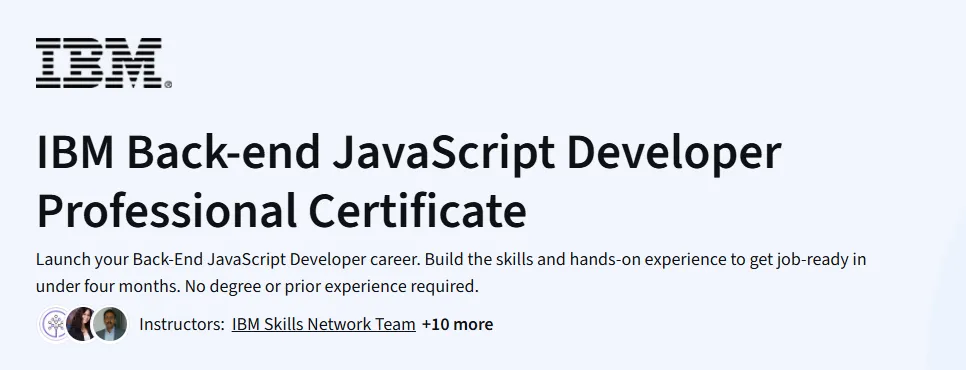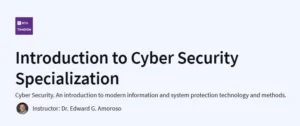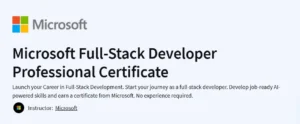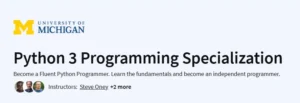What will you learn in IBM Back-end JavaScript Developer Professional Certificate Course
Core JavaScript skills for back-end development.
How to use Node.js, Express, and REST APIs.
Working with NoSQL databases like MongoDB.
Debugging, testing, and securing JavaScript applications.
Building and deploying complete back-end applications.
Program Overview
Module 1: Introduction to Software Engineering
⏳ Duration: 1 week
Topics: Developer roles, software development lifecycle, tools overview
Hands-on: Basic developer environment setup
Module 2: JavaScript Basics
⏳ Duration: 2 weeks
Topics: Syntax, variables, functions, loops, arrays, objects
Hands-on: Simple programs to practice logic building
Module 3: Version Control with GitHub
⏳ Duration: 1 week
Topics: Git basics, branching, merging, pull requests
Hands-on: Push and manage code in GitHub
Module 4: Backend JavaScript with Node.js
⏳ Duration: 3 weeks
Topics: Node.js fundamentals, modules, package management
Hands-on: Build a CLI or local Node.js tool
Module 5: Express and REST APIs
⏳ Duration: 3 weeks
Topics: Express.js routing, middleware, creating APIs
Hands-on: Build a CRUD REST API
Module 6: MongoDB and NoSQL
⏳ Duration: 2 weeks
Topics: Schema design, CRUD operations with MongoDB
Hands-on: Connect backend to database
Module 7: Testing, Debugging & Security
⏳ Duration: 2 weeks
Topics: Unit testing, error handling, securing APIs
Hands-on: Write secure, testable APIs
Module 8: Final Capstone Project
⏳ Duration: 3 weeks
Topics: Full back-end app integrating all learned skills
Hands-on: Complete and deploy a working backend system
Get certificate
Job Outlook
High Demand: JavaScript and Node.js developers remain in strong demand globally.
Roles: Back-End Developer, Full Stack Developer, Node.js Engineer.
Salary Range: $70,000–$120,000/year globally, higher in U.S. and Europe.
Freelance Potential: High for API and backend systems.
Specification: IBM Back-end JavaScript Developer Professional Certificate
|
FAQs
- Designed for beginners, but still useful for intermediates.
- Covers fundamentals plus practical backend systems.
- Includes testing, debugging, and security practices.
- Capstone projects provide real-world coding experience.
- Intermediates may progress faster through early modules.
- Focuses only on server-side development.
- Covers Node.js, Express, REST APIs, and MongoDB in depth.
- Excludes frontend frameworks like React or Angular.
- Ideal for learners aiming at backend specialization.
- Can be combined later with frontend skills for full-stack roles.
- Node.js, Express, MongoDB are open-source and industry standard.
- GitHub and testing tools apply universally.
- Deployment concepts adapt easily to AWS, Azure, or GCP.
- IBM provides context, but skills aren’t vendor-locked.
- Knowledge gained is broadly applicable across tech stacks.
- CRUD APIs using Node.js and Express.
- Database-backed applications with MongoDB.
- Secure and tested API endpoints.
- A capstone integrating APIs, databases, and deployment.
- Portfolio-ready apps showcasing backend expertise.
- Back-End JavaScript Developer.
- Node.js Engineer or API Developer.
- Junior Full-Stack Developer (with added frontend).
- Database-Connected Application Developer.
- Freelance backend projects for startups/clients.





